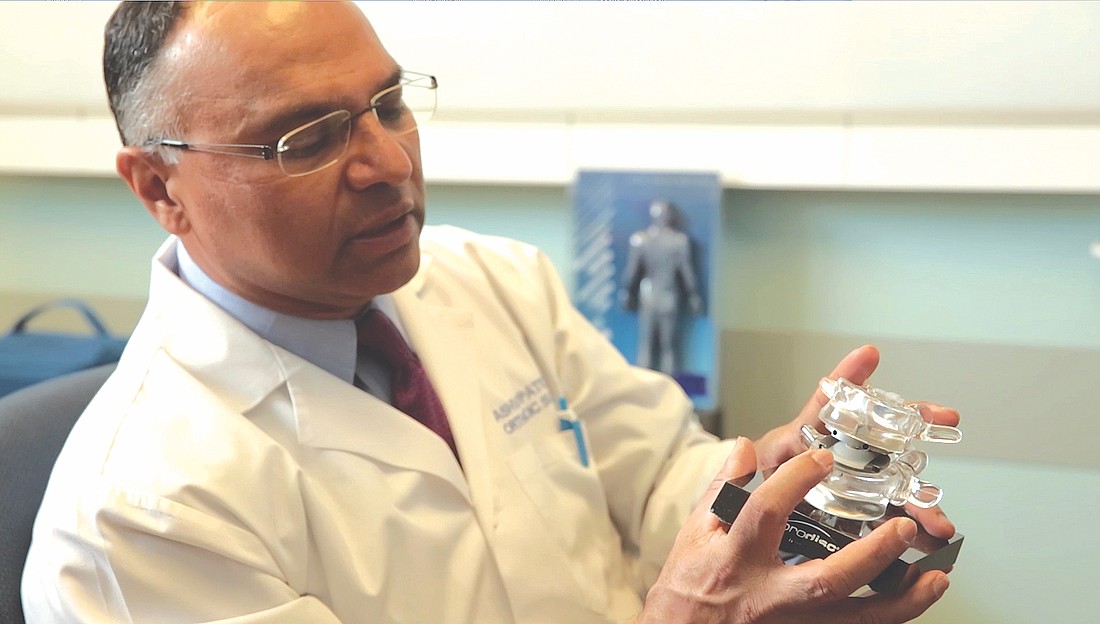- October 23, 2024
-
-
Loading

Loading

Sarasota resident Dr. Ashvin Patel is a spine surgeon at Sarasota Memorial Hospital. He is leading studies at the hospital that aim to create new and improved techniques for spinal surgery to reduce pain.
I like that you can have immediate results. In a surgical field, you have a problem, and when you address it, usually the result is fairly evident. I like the cerebral part of figuring things out but also the mechanical part of the job. It gives you a chance to use your brains as well as your hands and your skills. You can't be a good surgeon if you're not a good clinician or diagnostician.
I wanted to do spine surgery, specifically, because it's more pensive. It's more analytical. You have to figure out which nerve is causing the patient's symptoms. You have to know a lot of different disciplines.
Also, I think I chose spine surgery above all the other subspecialties in orthopedics because when I was in my training, they did not have their revolution of new, successful operations. They were just starting to scratch the surface. I figured that during my lifetime, I would see tremendous changes in the field, and I would be able to stay interested in the field because there are so many changes coming. I would be able to offer better treatments than my mentors or predecessors had.
I have a lot of doctors in my family. My father is a physician, and he certainly had an impact on my choice. The orthopedic surgeons I worked with were generally happy in their field. A lot of surgeons you meet are so stressed. When I did my fellowship, there were a couple of surgeons that inspired me to pursue newer technology and disc replacements, for example.
The benefits of fusion are obvious. You have an unstable spine, and you stabilize it, and the person's pain relief is generally predictable. The problem with fusion is it affects the level above and below where you perform the fusion. If you fuse one vertebrae at one level in the lumbar spine, the level above and below now have to compensate by doing more work. That puts them at higher risk for getting adjacent segment disease or early arthritis.
The two studies I'm doing, one is for the cervical spine, which is a two-level disk replacement study where instead of fusing the two levels, we replace them with a disc. The second study is where we replace the facet with an implant that allows motion. Where the facet used to be, instead there's an implant that acts as a facet. A facet is a joint in the back of your spinal column.
We're starting to use robotics for placement of implants and screws. We're also getting better at biologics. When we try to fuse somebody, instead of harvesting bone from their pelvis, we are using biologic materials that are made in the laboratory to try to get bones to fuse.
When the patient comes back and tells you their arm or leg or back or neck pain is gone. The most rewarding part is seeing the patient walk again and seeing them do their activities of daily living and be more active, which in itself is a requirement if you're going to live the long life that most of us are now going to live because of improvements in our diet and health care. When someone is able to remain active, they don't get as many chronic diseases.
I like hiking, biking, skiing. I try to play tennis twice a week. I try to swim about four times a week. I like traveling. I’m a product of an immigrant family, so I've come from another part of the world. My family traveled a lot when I was younger. I like seeing different parts of the world and meeting different kinds of people, trying out different food, learning about cultural differences and so on. I wish I had more time to read, but when I have free time, I tend to use it to travel and play sports and spend time with my friends and family.
In the U.S., I travel to Colorado because I like the recreational activities that you can do there: skiing, hiking, biking. Overseas, I've traveled a lot, so it's hard for me to pick one spot. I like traveling to Africa because it's so different from the rest of the world. The geography, the wildlife, the people, and there’s a lot of diversity. I like traveling to my homeland, India, to see my relatives. It's really special for me to talk to a street vendor or go to a restaurant and be able to speak the language.